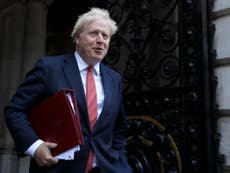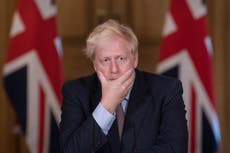It’s time Boris Johnson admitted he’s to blame for Britain’s disastrous coronavirus response
Covid-19 has so far killed some 60,000 people in the UK. The prime minister may not be criminally culpable for this catastrophe, but he is undeniably responsible for the decisions that led to it
Your support helps us to tell the story
From reproductive rights to climate change to Big Tech, The Independent is on the ground when the story is developing. Whether it's investigating the financials of Elon Musk's pro-Trump PAC or producing our latest documentary, 'The A Word', which shines a light on the American women fighting for reproductive rights, we know how important it is to parse out the facts from the messaging.
At such a critical moment in US history, we need reporters on the ground. Your donation allows us to keep sending journalists to speak to both sides of the story.
The Independent is trusted by Americans across the entire political spectrum. And unlike many other quality news outlets, we choose not to lock Americans out of our reporting and analysis with paywalls. We believe quality journalism should be available to everyone, paid for by those who can afford it.
Your support makes all the difference.Boris Johnson knows he’s to blame for Britain’s disastrous coronavirus response – it’s time he admitted it.
Covid-19 has so far killed some 60,000 people in Britain. Many should still be alive. Our record is among the worst in the world. Boris Johnson may not be criminally culpable for this national catastrophe, but he is undeniably responsible for the decisions that led to it.
He must know that himself. Why else would he be trying so hard to dodge the blame?
The fate of Public Health England says it all. PHE is accountable to ministers. If they didn’t like its approach, they could have imposed another. They could have given it more money and staff, hollowed out as it was by years of cuts. They could have changed its mandate.
Instead they make it the villain in an alternative reality drama whose heroes – themselves – would be leading us to the Promised Land if only they were not undermined at every turn by obstructive public servants and institutions bent on sabotage. “Following the science” means “blame the boffins”. Anonymous fingers have pointed by turns at civil servants; doctors, nurses and carers; NHS England; local authorities; previous governments; young people; and even Matt Hancock.
With this comes the full repertoire of Trumpian techniques to draw attention away from the government’s mistakes. Statistics manipulated, goalposts moved, dead cats slammed down, fights picked, culture wars unleashed, hapless officials thrown under buses and, yes, lies told, all to sustain the illusion that we are fortunate indeed to be so wisely and decisively led.
But despite early warnings, the prime minister came slowly to the helm. Through March, he flirted with a lethal strategy of herd immunity, abandoned test, trace and isolate (TTI), ruled out quarantine for arrivals from Covid-19 hotspots, and delayed the lockdown: all to the alarm of most independent public health professionals.
More followed. Abandonment of care homes, and the entire care sector, behind claims about a “protective ring”. Failure to get a grip on shortages of protective clothing amid denials that these were costing lives. When TTI resumed, instead of it being entrusted to experienced local public health teams, it was outsourced to Serco, Sitel, Deloitte and G4S, under a false NHS flag and the leadership of an unqualified and commercially unexceptional, but politically reliable, former telecoms boss. Predictably this has yet to deliver the service we need.
Compounding this has been an approach to communication guaranteed to erode trust and confidence. From the prime minister down, those speaking for the government have been reactive, not proactive, evasive not candid, patronising not sympathetic. They have said one thing one day and another the next. They have offered no plan, only slogans. Averse to listening and consultation, they won’t trust those who must implement their often last-minute pronouncements.
They have shown no empathy with the victims of this pandemic and those most at risk. And when push came to shove with the Cummings Northern Tour, it was “do as we say, not as we do”.
The pandemic has stretched everyone. But the key choices have been political. A prime minister who insists on slavish obedience from his cabinet and total control from No 10 can’t complain when the buck stops with him.
Each blunder was warned against. Each could have been mitigated if not avoided by applying basic public health principles. From South Korea, Taiwan and New Zealand to Germany and Ireland, leaders who have combined these principles with honesty and humility have invariably done better.
The public inquiry will, it must be hoped, work forensically through all this. But the prime minister has already kicked it so far ahead as to ensure it can neither confront him in real time with the consequences of his decisions nor help us learn urgent lessons. Meanwhile worse now awaits us as the nights draw in after an eerie summer, perhaps from the virus itself, certainly from its social and economic effects.
We urgently need an autumn reset. We need a government, and a prime minister, running our country not fighting campaigns or chasing headlines. We need them to talk to us with honesty and grace, to win back our trust and to bring us together behind a credible plan.
Scotland rightly aims, with its “zero Covid” strategy, to eliminate community transmission of the virus. That should be the plan in England too. It should have been all along. Only when the daily fear of contagion has gone will people find the confidence to bring our country fully back to life.
The prime minister’s hero, Winston Churchill, wrote: “The use of recriminating about the past is to enforce more effective action at the present.” Boris Johnson must urgently apply this to his own performance. He needs, in short, to take responsibility.
The British people are the real heroes in this drama. They know the prime minister’s job is thankless and he too nearly died. Even now, after all they have endured, they will forgive and move forward if only he can find the courage to own the choices he makes and the consequences for everyone else.
Otherwise, at a price, we will eventually find a way past those consequences. But they will hang like an albatross for evermore around Boris Johnson’s neck.
John Ashton has been a senior civil servant and diplomat, and latterly a full-time carer. His cousin John Ashton is a former president of the Faculty of Public Health and a regional medical officer. The latter’s book, Blinded by Corona, will be published by Gibson Square on 1 October




Join our commenting forum
Join thought-provoking conversations, follow other Independent readers and see their replies
Comments